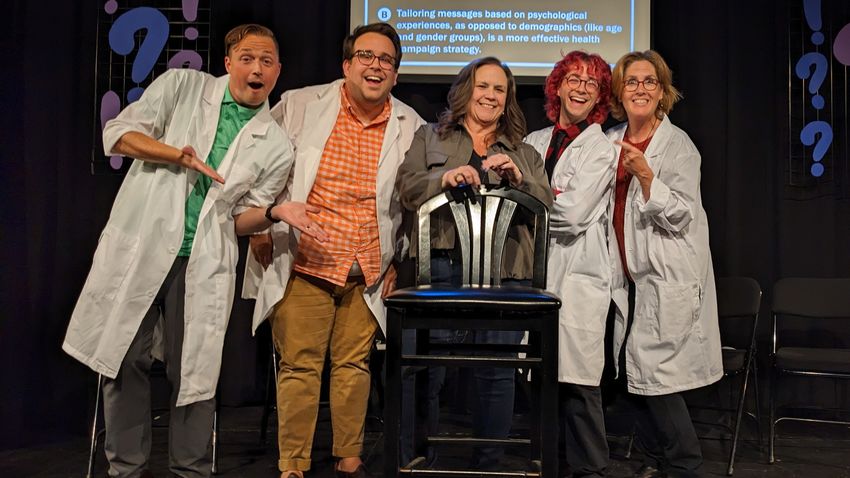
As director of the College of Public Health’s Risk Communication Lab, Sarah Bauerle Bass explores novel ways to deliver messages that promote public health efforts to diverse audiences. But could she convey a meaningful public health message via improv comedy?
The professor of social and behavioral sciences found out in September, when she was invited to perform with the ComedySportz Philadelphia troupe as a special guest “secret scientist,” for a science-themed Friday night show titled “Is That Right?”
“It brought back memories of my high school theater geek days,” Bass says.
The science comedy show was conceived by Kanu Pandey, a postdoctoral fellow at the University of Pennsylvania’s Annenberg School for Communication, who directed and co-produced it with troupe member Cara Hammer. Pandey studies humor. His research has attempted to merge it with science, investigating how political humor affects people’s decision making in politics.
“I realized that some of the things that make a good comedian are the same skills a scientist needs,” he says. “Improvisational comedians are discovering something on stage, coming in with curiosity, with a sense of honesty about what they know and what they want to know. Scientists discover in a similar way. I wanted to design a show around that. And hopefully make the audience feel like science is a little more accessible.”
Bass was tasked with explaining concepts in her field of expertise, like risk perception and vector message modeling, without losing her audience or castmates. The night was set up as a sort of game show, and the quick-witted improv comics provided most of the laughs.
The cast members first had to guess Bass’s academic specialty based on limited personal details: that she liked to read apocalyptic novels and didn’t care for Bruce Springsteen. The comedians guessed she might be a professor of depression or nanotechnology. Then Springsteen’s “Born in the USA” played as Bass walked on stage.
The cast members were asked to fill in the blank to complete an explanation: “You make thousands of decisions every single day. Unlike consumer decisions, like choosing a new throw pillow, decisions about our health are influenced by _____.” Cast guesses included “anxiety,” “mommy issues” and “couch color.” (The correct answer was risk perception.)
For a segment called “Podcast Shuffle,” cast member Mary Carpenter interviewed Bass and got her to explain that risk perception involves how we think about health risk in deciding what to do. Then the comics who hadn’t heard the definition interviewed each other, to try understanding it, in the style of audience-suggested podcast genres, such as ‘true crime’ and ‘Dungeons & Dragons.’
Improv players Shaun Kreider and Jake Lucas shifted into nerdy voices for the Dungeons & Dragons-themed podcast. “So, cleric, what is risk assessment?” Lucas asked, and Kreider explained a dangerous quest involving a dungeon master and a mimic, a shape-shifter that fools adventurers by transforming into inanimate objects. Even audience members who'd never picked up a 20-sided die got the idea.
To wrap up, Bass presented a rapid-fire slideshow explaining her work, without comedic support. She described how methods behind consumer advertising and marketing can be applied to deliver impactful health messages to populations. She ran through concepts like optimism bias, psychographics and perceptual mapping.
“They gave me strict a time limit, and that helped,” she says, suggesting that keeping it short isn’t always a hallmark of academic presentations. The audience had some laughs and went home knowing a bit more about risk perception and Dungeons & Dragons.
"There is evidence of using theater for public health communication and health education,” Bass says. In the end, she figured, playing a comedy club has things in common with classroom teaching.
"In class, you do feel like you're kind of performing in a way, trying to make sure that you're engaging students,” she says. “They can be a tough audience.”
